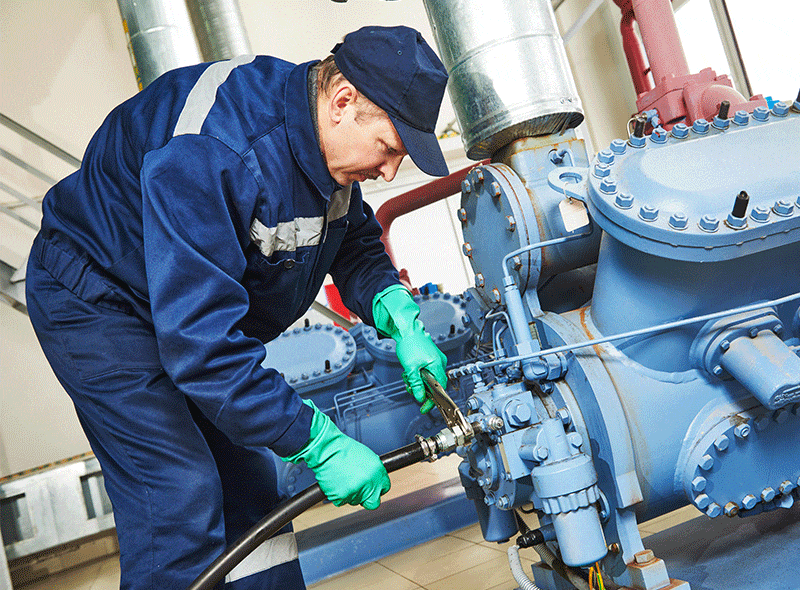Chiller Systems FAQs
The chiller system in your commercial building serves an important purpose – it helps keep your facility cool. If you have questions about your chiller system, we have the answers. Check out some of the most frequently asked questions (FAQ) about chiller systems below to learn more.
How Do Chiller Systems Work?

Chiller systems, which are a part of an HVAC system, help regulate temperatures in buildings by removing heat. They use liquid refrigerant to generate cold water for air conditioning. Here’s a breakdown of the basic cooling cycle of a chiller system:
During the cooling cycle, the refrigerant will change to a gas within the evaporator, which absorbs heat. Next, the gas refrigerant will be compressed by either a compressor or generator. After that, it will go through the condenser, which will remove unwanted heat energy. As it loses heat, the refrigerant will return to a liquid. However, it’ll be much cooler than it was at the beginning of the cycle. The refrigerant will then go back through the system again, continuing the cooling cycle.
What Types Of Chiller Systems Are Available?
There are two main types of chiller systems used today – vapor-compression chillers and absorption chillers. Themain difference between these two systems is how the refrigerant is changed back into a liquid. Absorption chillers change gas back into a liquid using only heat. Vapor-compression chillers, on the other hand, need a metering device to covert the gas into a liquid. The metering device limits the flow of liquid refrigerant in order to change the warm refrigerant into gas. The cooler liquid refrigerant then goes to a separate loop, while the warm refrigerant gas goes back to the compressor. And, this starts the cycle over again.
What’s The Difference between Air-Cooled and Water-Cooled Chillers?
Air-cooled chillers are cooled by just that – air. They’re often used in small- or medium-size facilities, as they require a healthy amount of ductwork. Water-cooled chillers, in contrast, are connected to cooling towers. They’re cooled by a separate condenser water loop. Additionally, they’re able to push out heat into the atmosphere thanks to the separate cooling tower. When compared to air-cooled chillers, water-cooled chillers are much more energy efficient. That’s why they’re often used in large commercial buildings.
What Type of Maintenance Does a Chiller System Need?
Like any other component in your HVAC system, the chiller requires regular maintenance to continue operating at peak performance. For instance, on a weekly or monthly basis, the temperature, pressure, fluid levels, and flow rates should be checked. Every few years, the tubes will should also be cleared of possible contaminants, like mineral buildup, lime scale, and algae. Over time, you may also need to replace pump systems, seal water leaks, and repair the compressor.
Which Chiller System Will Work Best for My Facility?
If you’re unsure what type or size chiller system your building requires, get in touch with The Severn Group. With over 100 years of combined field experience, our technicians can help you find the right system for your facility. We provide chiller installations and replacements, as well as chiller maintenance, to meet your HVAC needs.
